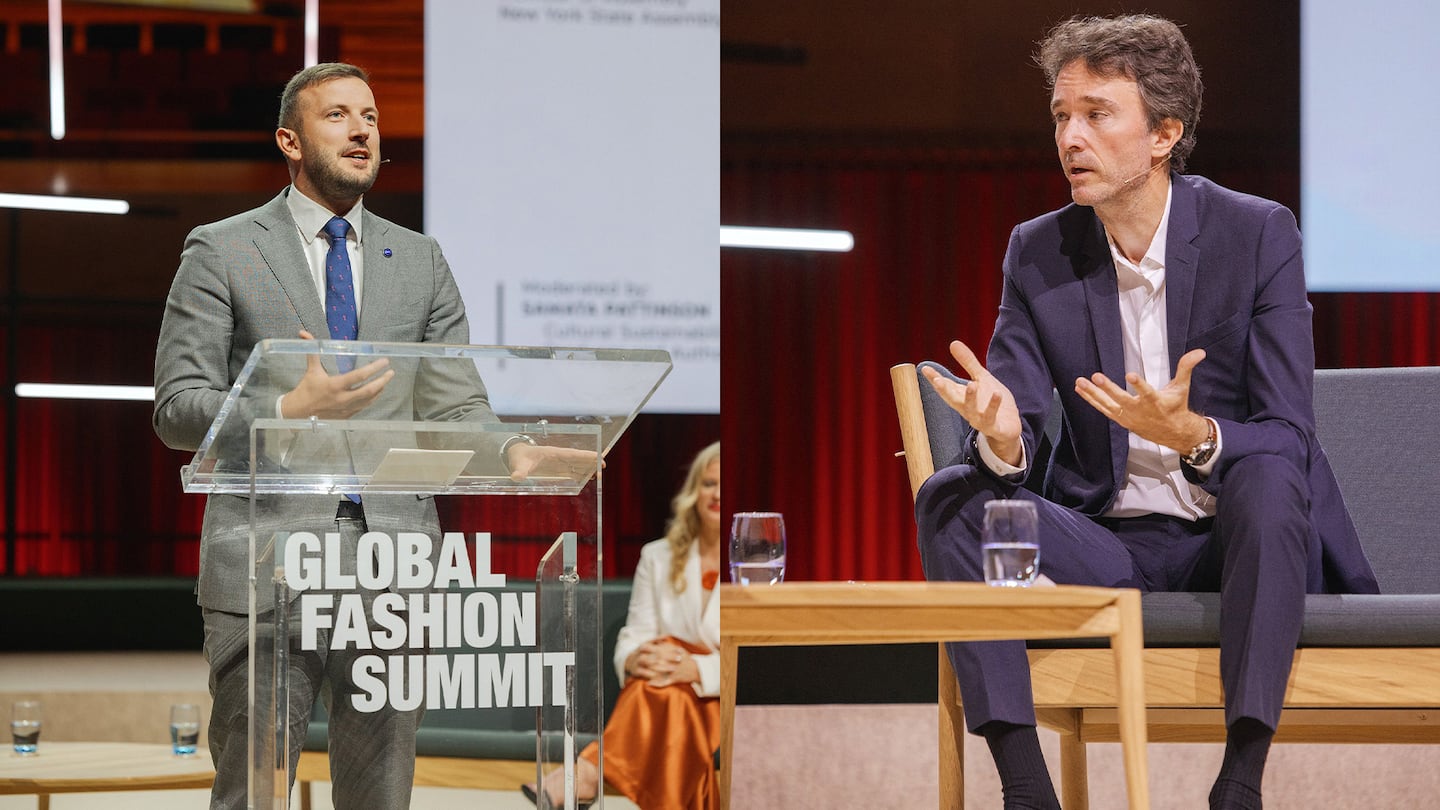
The Business of Fashion
Agenda-setting intelligence, analysis and advice for the global fashion community.

Agenda-setting intelligence, analysis and advice for the global fashion community.

Fashion is not on track to meet its sustainability commitments.
The industry’s emissions — which account for roughly 2 percent of the world’s total — are still rising. The billions of new garments it produces each year contribute to deforestation, nature loss and water pollution. Most of those T-shirts, dresses and jeans ultimately end up dumped in landfill in poor countries. Meanwhile, the human toll of the industry’s low-cost, high-impact business model has yet to be fully quantified.
The state of affairs is “absolutely unacceptable,” Europe’s environment commissioner Virginijus Sinkevičius said on the sidelines of the Global Fashion Summit this week, adding that Europe’s regulators are set to take action.
It was a message that reverberated across fashion’s flagship sustainability event, where the presence of high profile policymakers from Europe and the US for the first time leant new momentum to old conversations and LVMH’s Antoine Arnault made a surprise call for a new, luxury-focused sustainability pact.
ADVERTISEMENT
Read on for key takeaways from this week’s annual gathering of fashion’s sustainability power players.
LVMH head of image and environment Antoine Arnault headlined one of the most talked about sessions of the summit, addressing criticism of the French giant’s sustainability engagement, proclaiming luxury “sustainable by nature” and calling for a luxury-only sustainability pact.
“I know we were very much criticised a few years ago when we did not sign the famous Fashion Pact,” Arnault told conference attendees, referring to an industry-wide initiative launched by François-Henri Pinault, the CEO of rival French fashion conglomerate Kering, on the same stage four years earlier. “It was, in our opinion, not the right thing to do at that time to be associated with the actors of fast fashion.”
For many in the audience the message jarred, given LVMH’s historic disengagement with industry sustainability initiatives (LVMH noted it does participate in several groups, including the UN-backed Fashion Charter, which it joined in 2021) and flagship brand Louis Vuitton’s latest fashion show, which leaned into the kind of hype fashion entertainment culture that has seen luxury brands issue new products at a faster and faster pace.
Arnault’s distinction between the interests and impact of luxury and lower-cost retailers also played into an emerging debate over how “fast fashion” should be defined as regulators step up their scrutiny of the industry.
Investors seem to be responding to LVMH’s messaging, with the French luxury giant attracting significant interest from fund managers marketing their portfolios as promoters of environmental and social goals, according to a Bloomberg report this week.
For years, fashion has been ignored by regulators. Not any more.
The industry is facing 16 pieces of legislation in Europe alone, as policymakers look to crack down on greenwashing and take on throwaway fast fashion.
ADVERTISEMENT
Commissioner Sinkevičius and Anna Kelles, the New York State assembly member spearheading the New York Fashion Act — a wide-ranging sustainability bill that would impact any large fashion company operating in the state if passed — were both given prominent billing. But the EU’s looming suite of fashion-focused regulations were the biggest focus for the week.
Europe’s policymakers have said they want to “end fast fashion” and are expected to provide details in the coming months on proposed regulations that would introduce design requirements to make clothes longer-lasting and more repairable – and possibly mandate the use of recycled content – a likely ban on the destruction of unsold goods, requirements for brands to take back old clothes to facilitate more recycling, and labelling rules intended to help consumers make better choices.
“We need to design clothes to serve us longer. And if we are tired of them, if we wear them once or twice and we don’t want to wear them again, there has to be a second life for them,” commissioner Sinkevičius said on the summit’s sidelines. “All these piles of waste, they don’t just disappear. They go somewhere, they pollute somewhere.”
Much of that waste is sent to Ghana, dumped in landfill and strewn across beaches, Sammy Oteng, senior community engagement manager at Ghana-based anti-fashion waste advocacy group the Or Foundation, told audience members.
In one of the most powerful and emotionally charged sessions of the week, Oteng doled out examples of clothes waste brought over from Kantamanto market, the massive secondhand clothing market where The Or Foundation focuses its work.
“It’s very disgusting, but this is our reality,” said Oteng.
The organisation is lobbying to ensure regulation intended to tackle fashion’s waste benefits the communities where it ends up, also powerfully raising a point about representation and who gets a say in rules that are going to reshape the whole industry.

Sustainability conversations often dwell on fashion’s supply chain (where most of its environmental impact takes place) or the problems created when garments are thrown away, but they rarely look at the more intangible role the industry’s marketing machine plays in stoking the underlying problem of overconsumption.
ADVERTISEMENT
Unless that changes (and with it the industry’s whole business model), fashion will find it “incredibly difficult” to meet its sustainability targets, the UN said in a provocative call for the industry to use its marketing clout to help deliver on climate goals, instead of encouraging behaviour that flouts them.
The UN laid out exactly what that might look like in a playbook published at the summit and designed to outline what fashion communication should look like in order to align with global climate goals. Though not a formal target, it’s a principle enshrined in the Fashion Charter, whose signatories include Kering, H&M Group and Nike.
Recommendations include using advertising to promote more sustainable behaviours like resale, rental and repair and to reduce the desirability of newness. The idea that fashion subvert its sales engine points to just how drastically the industry still needs to change.
“Currently, we have a narrative that is based around newness, immediacy and disposability and we need one that is based on circularity, equity and care,” said Bettina Heller, textiles lead at UNEP.
On the sidelines, many conversations focused on what was left unsaid on the main stage, where large brands were often allowed to put an optimistic sheen on slow progress without challenge.
What wasn’t much discussed was the question of money — a critical and divisive issue.
Meeting fashion’s sustainability goal is going to cost billions of dollars and most of that is going to need to be spent in the supply chain. Who should pay and how is a live issue made particularly delicate by the broader gloomy economic climate.
Manufacturers say they are facing an impossible squeeze from brands who are demanding lower prices, while also pressing for major eco-investments. But the subject got little air time at the summit.
Until that question of climate funding is really addressed, it’s hard to see action taking place at scale.
Disclosure: LVMH is part of a group of investors who, together, hold a minority interest in The Business of Fashion. All investors have signed shareholders’ documentation guaranteeing BoF’s complete editorial independence.
The European Fashion Alliance, a coalition of groups including France’s Fédération de la Haute Couture et de la Mode and Italy’s Camera Nazionale Della Moda Italiana, has weighed in on EU plans to regulate fashion. They’re not entirely happy.
In a high-octane gathering of senior executives, the French luxury conglomerate mixed updates on its environmental progress with thinly veiled criticisms of its rivals.
The ultra-fast fashion company launched a $50 million fund to tackle waste at the industry’s annual sustainability gathering in Copenhagen this week. Many saw it as greenwashing, but it’s straight out of fashion’s sustainability playbook.

Sarah Kent is Chief Sustainability Correspondent at The Business of Fashion. She is based in London and drives BoF's coverage of critical environmental and labour issues.
Europe’s Parliament has signed off rules that will make brands more accountable for what happens in their supply chains, ban products made with forced labour and set new environmental standards for the design and disposal of products.
Fashion’s biggest sustainable cotton certifier said it found no evidence of non-compliance at farms covered by its standard, but acknowledged weaknesses in its monitoring approach.
As they move to protect their intellectual property, big brands are coming into conflict with a growing class of up-and-coming designers working with refashioned designer gear.
The industry needs to ditch its reliance on fossil-fuel-based materials like polyester in order to meet climate targets, according to a new report from Textile Exchange.